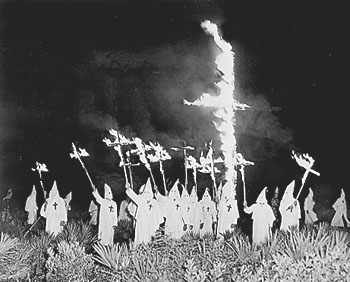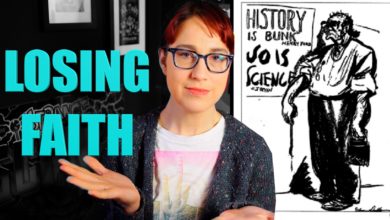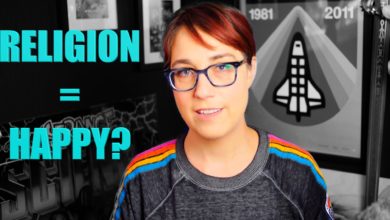Religion and Social Justice in America: The Push

This piece is adapted from my research and notes for the speech I gave this past Sunday, May 20th, at the Orange County Freethought Alliance Conference. The talk was entitled “Push and Pull: The Role of Religion in Social Justice.” Look for the follow-up to this piece tomorrow about the positive role religion has played in social justice.
Generally speaking, among the skeptically-minded, religion is seen almost universally as a hindering force to anything approaching progress in society. Moving backwards in history, it is easy to see why that is the case.
In terms of LGBT rights, religion is notoriously hostile towards progress. Same-sex marriage, the issue that has become something of a poster child for LGBT rights, has been opposed at every stage by some very powerful religious groups. In California, most of the funding and support for Proposition 8, the voter referendum that denied same-sex couples the right to marry, came from a church that I will not name.
Religious groups have also been on the forefront of opposing hate crime legislation, often in the name of religious “freedom” or “liberty.” While some disagree with hate crimes as a concept, the fact remains that terrorizing someone in a minority community for being a member of said community affects all of its members and has wider repercussions than the harm done to the victim of the crime. In the case of the LGBT community, it will likely have a silencing, shaming, closeting effect. The same goes for bullying, both in terms of its effect and religious support of what seems to obviously be the wrong side on the issue, cloaked in the notion of freedom of speech. You don’t hear about religious groups outraged at the lack of free speech for, say, Jessica Ahlquist, but when it comes to children who bully their LGBT peers, it’s another story.
Yet another area where religion serves a hindering role in progress is with employment protections. In 29 states, still legal to fire people based on the gender of the people with whom they are nonplatonically involved. In 38 of them, the same applies based on the gender with which they identify.

When it comes to the many and varied movements for women’s rights, including the feminist movement, mainstream, organized religion has had a less than stellar role, to say the least. As shown by the War on Women, reproductive choice is always in a precarious position, and I’m not just talking about abortion. Birth control is something fairly uncontroversial nowadays, given that the vast majority of Americans use it, and yet access to it has been recently and severely challenged. In terms of abortion rights, which remains fairly controversial, religious groups have been at the forefront of attacking, shaming, and even murdering people whose actions are pro-choice.
Further back in history, the Klu Klux Klan (which might still exist but has been defanged to a large extent) relied fairly heavily on Christian wording and appeals to Christianity to rouse their supporters in opposition to the Civil Rights Movement. For example:
Unlike the state of Utah, I am fairly sure the cross is a symbol of at least somewhat related to Christianity.
The Civil Rights Movement was the necessitated due to the legacy of slavery. After people were enslaved and brought over the Atlantic to the Americas, their native cultures, religions, and languages were literally beaten out of them in order to ensure subservience. Religion played a crucial role in convincing slaves to obey, the idea being that the white slaveowner was the representative of the Christian god to the enslaved. It’s not all in the Old Testament, either — even Jesus told slaves to be obedient to their masters.
Given all of the evidence, both historical and contemporary, it can be difficult to imagine religion taking a neutral, let alone positive, role in social justice movements. However, it has, and it is historically disingenuous to completely deny its legacy.







There are “liberation catholic” groups and some of the more liberal traditional (Anglican, United Church) congregations which fairly consistently come down on the side of progress, fairness, and justice, but they invariably do so in violation of their “holy” books. The Bible, Koran, Torah, are all pretty clear that homosexuality is an “abomination”, women should sit down and shut up, children should be killed if they get too lippy, slavery isn’t all bad, all other humans are the property of the only group outside the priesthood who are allowed any power: adult men… etc. So IMHO, it isn’t religion which has a “positive legacy”, it is people who come together in opposition to their respective religious orthodoxies and do good things in spite of not because of their religions. As Hypatia Bradlaugh Bonner famously said: “Heresy makes for progress”. The implication that orthodoxy stifles and reverses progress has been borne out by the entire recorded history of almost all religions with the possible exception of the Janes and a few other minority, largely ignored sects.
With all what Heina offers in this article, I find it amusing to see the opinion given in today’s local paper in Arizona, in which writer states that Church values are “solid values”.
The writer states that “church-minded values liberate everyone from chaotic, destructive behaviors”.
It’d be interesting to see which of those values are represented in actions, as described by Heina.
Heina,
You really should get on Twitter. I would follow you and I would bet a whole lot of other people would.
I keep trying to use it more, but I don’t enjoy how fast-paced it is in that it’s hard to keep up with people. Plus, I tried to log in now with the intention of putting my name on it and it was down. Clearly a Sign (;
I’m @futilityfiles, btw.
Heina,
Thanks. I’ll look you up on Twitter!
I have to agree with ufischer. Religion runs against progress and civil society, where ever it is actually **followed**. It is progressive and beneficial to change only when its contents are being selectively edited, or ignored, in favor of “progressive interpretations”. To make the claim that there is any other conclusion is like claiming that modern genetic testing is the **part** of the Eugenics movement, therefor some followers of Eugenics are OK people. No… You don’t keep using the same label for what you are. You don’t play Catholic, for example, and defend the bloody insane BS that it represents, then go, “But we don’t really follow all the crazy bits, or listen much to the guy in the funny hat that claims to run it.” Religion ends up being a catch all for everything from outright madness, to mild delusion, and arguing that the mildly deluded ones are progressive doesn’t change the fact that the outright loony toons ones are, to an extent, dead right, when they say that all those mild ones **are not following the original script**. That the crazy ones think this is a bad thing, and that mass murder, misogyny, injustice, insanity, etc. are the “good attributes” of their faith is a) the reason that religion has no value at all, and b) a completely accurate depiction of what the religion **itself** claims, in most cases, to be the “correct way to do things”.
So, yeah, its not religion that promotes good values, it is people selectively ignoring it, and doing good things **in spite of** or **in ignorance of** it. Neither of which promote the idea that the religion is what is of any actual value.
The follow-up will make the case for religion’s contribution.
I have to say, I used to be fairly agnostic (excuse the pun) as to my stance on religion. It has undoubted benefits for large sections of the population and the submission to a higher power philosophy, has provided a fairly unique path to rehabilitation for some of the criminally insane.
Many members of family and friends find great comfort from the community aspects also.
However, after spending 5 years in Glasgow with it’s Catholic / Protestant apartheid, I have to say I would happily see a world without it. The justification of judgement, the unquestioning crusade of moral righteousness and a safe refuge for prejudice are prices I don’t feel we can afford in this day and age.
On the other hand, what would replace these faiths could be altogether more terrifying, so maybe it’s better the devil you know.
However, the vacuum would at least provide a route to progress.